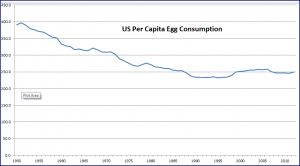 There has been a flurry of news reports following on from the publication of the US government’s ‘Scientific Report of the 2015 Dietary Guidelines Advisory Committee’ which included the tacit admission that the guidelines which have been in place for decades got it fundamentally wrong when it comes to cholesterol. If you take a look at Part D, Chapter 1 you can see this little gem:
There has been a flurry of news reports following on from the publication of the US government’s ‘Scientific Report of the 2015 Dietary Guidelines Advisory Committee’ which included the tacit admission that the guidelines which have been in place for decades got it fundamentally wrong when it comes to cholesterol. If you take a look at Part D, Chapter 1 you can see this little gem:
Cholesterol. Previously, the Dietary Guidelines for Americans recommended that cholesterol intake be limited to no more than 300 mg/day. The 2015 DGAC will not bring forward this recommendation because available evidence shows no appreciable relationship between consumption of dietary cholesterol and serum cholesterol, consistent with the conclusions of the AHA/ACC report. Cholesterol is not a nutrient of concern for overconsumption.
Effectively tens of millions of people are taking cholesterol reducing drugs – statins – on the basis of guidance which is unsupported by the evidence. For years those doctors and scientists who dared to question the ‘self-evident’ truth that cholesterol was a killer were labelled as cranks or deniers. Well, it turns out that the sceptics were right all along. That statins work to reduce cholesterol levels is clear and undisputed – that this is related to reductions in cardiovascular events and overall mortality remains a matter of considerable dispute – and it’s not something that I want to get into here.
However, what I do want to point out is that as part of the anti-cholesterol dogma that was inflicted on us by our governments for a considerable period was the advice to cut down on foods which were high in in cholesterol – and that included eggs. One effect of this has been a reduction in our consumption of eggs – as shown by these figures from the US Department of Agriculture.
Now that cholesterol is on the way to being rehabilitated, we can take a look at what the science says about egg consumption. Is it good or bad? Safe to put eggs back on the menu or not?
A review published in the American Journal of Clinical Nutrition in 2013 looked at the data from 16 different studies, covering data from 22 independent cohorts (groups of people) and with follow-up periods of between 6 and 20 years. Pooling all of this data together in a meta-analysis that looked at a range of measures related to cardiovascular disease. The conclusion?
…egg consumption is not associated with the risk of CVD and cardiac mortality in the general population
There was a proviso though, those in the group with the highest consumption of eggs had an increased risk of developing type II diabetes. And in patients with type II diabetes, higher egg consumption was associated with a greater risk of cardiovascular disease. At this point it’s only fair to point out that taking statins to reduce your risk of cardiovascular disease also increases your risk of developing type II diabetes, but that’s a different story…
So, I think it’s fair to say that eggs can safely go back on the menu.
But if there’s a take home message here, it’s that we really do need to be more sceptical when it comes to ‘scientifically’ driven policy messages…


